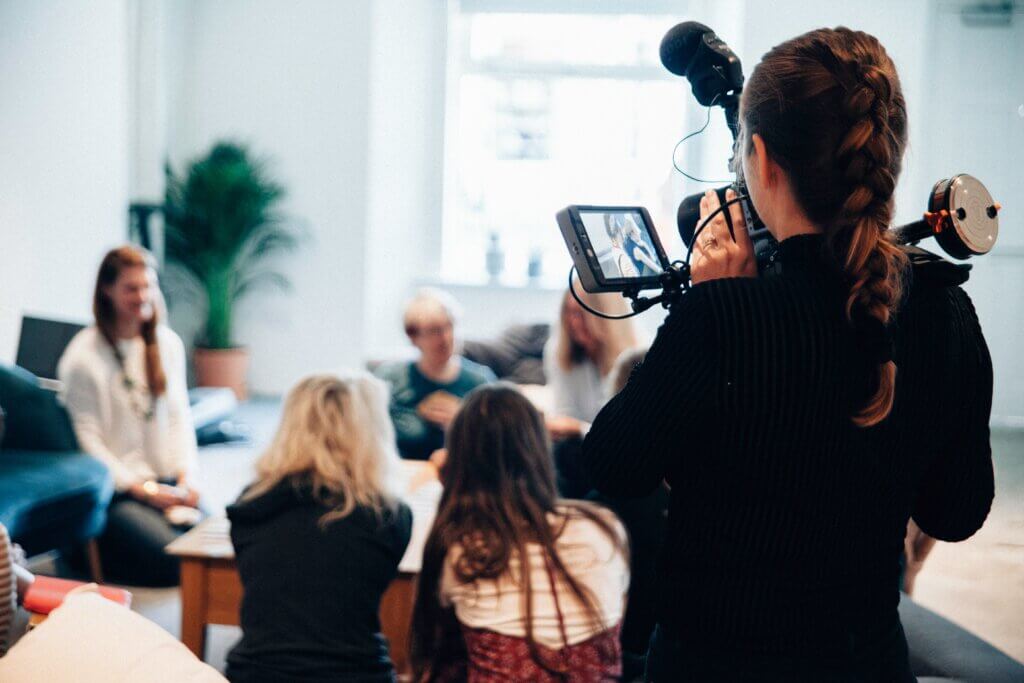What is a Broadcast Journalist?
Broadcast Journalists are in charge of creating and delivering news stories on television and radio in various markets. They work on the front lines of television and radio journalism. Broadcast Journalists are regarded as the face and voice of a news story.
The importance of Broadcast Journalism in today’s society extends beyond simply providing accurate information. It is also critical to get the information out to the broader audience. It might be life or death for some. Because journalism is connected with ‘truth,’ Broadcast Journalism must provide facts to the public without misinterpretation or misunderstanding. It is also critical that the news or information reach as many individuals as possible.
The Broadcast Journalist exhibits several unique characteristics and competence in investigating and reporting on stories. Unlike print journalists, Broadcast Journalists must maintain their cool under pressure. They frequently report live from the site of a story. Due to numerous distractions around them while reporting, Broadcast Journalists must have a strong ability to focus.
Responsibilities
Broadcast Journalists are responsible for a wide range of tasks, depending on their specialisations, these tasks could include:
- Conducting research to generate story ideas and angles, interviewing sources, and obtaining evidence to back up assertions in the piece
- Writing news articles and creating news broadcasts that meet the management goals of the station or network, such as raising ratings and drawing new viewers
- Collaborating with producers, editors, camera operators, and other staff members to create, produce, and broadcast news material.
- Reporting on breaking news items as they occur, interviewing those affected by the incident, and sharing information with viewers or readers as it becomes available.
- Interviewing guests on themes such as politics, entertainment, sports, business, science, technology, and the arts.
- Conducting expert interviews on financial planning, parenting, food, health, and vehicle maintenance.
- Writing radio scripts or creating video segments for television news shows using computer tools such as Photoshop or Premier Pro
- Reporting on natural catastrophes, crime, politics, sports, economics, science, technology, and other topics of community concern
Salary
The UK national average salary for a Broadcast Journalist is £34,900, ranging from £25,000 to £49,000. The average additional cash compensation amounts to £2,507, ranging from £1,352 to £4,649. The average salary for a Broadcast Journalist in London is £38,350, ranging from £28,000 to £52,000.
Working hours and work location
Working hours for broadcast journalists frequently involve unsocial hours. Shift employment is frequent, with morning shifts covering regional news on breakfast radio and television broadcasts and afternoon and evening shifts covering afternoon and nightly bulletins. Weekend work is frequently necessary, and most broadcasters only work on holidays. Broadcast Journalists operate in various environments, including television and radio studios, newsrooms, and on the road. They may be required to work long hours, including evenings, weekends, and holidays, and they may be required to travel to cover stories. Work may be stressful, and Broadcast Journalists may be under deadline pressure to fulfil the demands of live broadcasts or to finish their reports for the next day’s news programme.
What to expect
Before presenting a story, Broadcast Journalists do interviews and research, go to news events, and produce concise reports. As a Broadcast Journalist, you could specialise in one media, such as radio, television, cable, or the Internet. You might specialise in areas such as politics, sports, or business. As a radio Broadcast Journalist, you would collect audio sound bites for your reporting and be skilled with digital technology. As a television Broadcast Journalist, you may frequently construct video pieces and collaborate with editors to improve the visual impact of your on-air reporting. Broadcast Journalists must stay current on current advancements to keep their skills relevant and maintain a competitive edge in the industry. Here are the three most current trends shaping the job of contemporary Broadcast Journalists.
The Podcast’s Ascension
The podcast is a contemporary fad that has recently grown in popularity. This format lets people listen to audio information at their own pace, which makes it perfect for people who are short on time or have long commutes. Broadcast Journalists will need to learn how to develop and produce podcasts to remain competitive in the podcast sector. They may accomplish this by studying the fundamentals of audio editing and honing their interviewing abilities.
Social Media Will Grow in Importance
As social media grows more essential, Broadcast Journalists will need to learn how to use it to their advantage. Journalists may use social media to interact with their audience and obtain feedback on their work. It also enables them to publicise their experiences and reach a larger audience. To be successful in this industry, broadcast journalists must be familiar with all social media platforms and how to use them effectively.
Increased emphasis on investigative reporting.
Investigative reporting is becoming increasingly popular among news organisations looking for methods to stand out from the crowd. This trend will likely continue since investigative journalism provides readers with vital information they can’t get anywhere else. As investigative reporting grows in popularity, Broadcast Journalists will need to learn how to report on these investigations. This entails gathering information, conducting interviews, and crafting appealing narratives.

Qualifications
If you want to be a Broadcast Journalist, a Bachelor of Arts in journalism, mass media, or communication is a good starting point. Look for programmes that combine a strong journalism foundation with radio and television news and production courses. If you’re looking for approved journalism and communication programmes,the following accrediting agencies can provide information on related courses:
Media literacy, announcing, communication theory, and interpersonal communication may be included in your communication curriculum. You might study news writing, photojournalism, reporting and research, web journalism, and editorial reporting as a journalism major. A bachelor or even better masters degree in Computer science, foreign language, psychology, or business may also be advantageous.
Skills
must have skills:
To be effective, Broadcast Journalists must possess or acquire the following abilities:
- Communication abilities: As a Broadcast Journalist, you will need to communicate with a wide range of individuals, including fellow journalists, producers, camera operators, graphic designers, and others. Strong communication skills can assist you in working with others to produce an engaging tale. You’ll also need to be able to communicate effectively with your audience, whether you’re speaking to them through a microphone or writing to them.
- Critical thinking abilities: Critical thinking abilities can assist you in making informed judgments and solving challenges. As a Broadcast Journalist, you may be forced to think quickly on your feet and make judgments on what to do in an emergency. You may also need to think critically when conducting an interview or writing a piece.
- Public speaking abilities: Broadcast Journalists may be needed to offer live updates on the air or conduct interviews with other Broadcast Journalists or news anchors, therefore, public speaking skills are a crucial tool. Broadcast Journalists may need to encourage sources to give information with them, therefore public speaking abilities might come in handy while interviewing sources.
- Research skills: Broadcast Journalists need research abilities to assist them obtain information for their reports. For example, if a broadcast Journalist is covering a weather event, they may need to conduct research on local weather trends to deliver accurate information to their viewers.
- Teamwork abilities: Working in a group can help you improve your Broadcast Journalism abilities. You may collaborate with producers, camera operators, and other journalists to construct a narrative. This can assist you in learning how to collaborate with others and improving your collaboration abilities.
Work experience
While obtaining their degree, Broadcast Journalists generally receive on-the-job training in the form of an internship. Internships provide prospective Broadcast Journalists with hands-on experience reporting in the field.
They also assist students in networking with people in the industry who can assist them in finding jobs following graduation. Generally, the first step toward becoming a broadcast journalist is behind the scenes. A Broadcast Journalist’s career may begin at a small television or radio station. They might start by running the equipment used for broadcasting or by doing short spots like the local weather or hourly news.
As an aspiring Broadcast Journalist, you should seek employment experience through internships and part-time jobs at campus radio and television stations.
Career prospects

The job of a Broadcast Journalist is very competitive. There are usually a large number of applicants for the positions that are listed. But if you already work in the field and have a lot of relevant experience, you already have a foot in the door.
It is also very beneficial if the Broadcast Journalist is an expert in the topic in which he or she specialises. Although employment competition is severe, there are currently more chances in Broadcast Journalism than ever before. Cable television has an ever-increasing number of channels with a wide range of programming. Radio stations are also growing in popularity, and businesses understand that a skilled Broadcast Journalist may help enhance and sustain their ratings. There are a variety of job opportunities that place people in positions to report information on television or radio. For example, radio announcers provide information about future music, news broadcasts, and sporting events. They frequently include personal involvement and create a radio personality. Meteorologists primarily research climate and weather trends, but they also make forecasts for television and radio to advise viewers and listeners on what to expect.
Broadcast Journalists and editors have many of the same obligations when it comes to story building, altering information as needed to make it presentable. Much of the investigative work done by Broadcast Journalists is comparable to that done by novelists and writers of both fiction and nonfiction. Broadcast Journalists have strong opportunities for advancement. With experience, they can advance to roles such as news anchors, news directors, and executive producers. Broadcast Journalists should anticipate receiving improvements in compensation and responsibilities as their careers develop.
Broadcast Journalists and editors have many of the same obligations when it comes to story building, altering information as needed to make it presentable. Much of the investigative work done by Broadcast Journalists is comparable to that done by novelists and writers of both fiction and nonfiction. Broadcast Journalists have strong opportunities for advancement. With experience, they can advance to roles such as news anchors, news directors, and executive producers. Broadcast Journalists should anticipate receiving improvements in compensation and responsibilities as their careers develop.
Employers
Related Courses
This two-year, eight-month full-time degree is offered by the University of the West of Scotland London, and students can select from a range of start dates. During their time at UWS London, students can talk to professionals, guest lecturers, and experts in their field. The fact that this programme is offered on the London Campus, in the heart of the United Kingdom, allows students to be active within the UK’s journalism centre.
The University of the West of Scotland teaches this program at their London Campus, so you’ll be studying at the heart of the UK’s industry. This one-year, full-time curriculum is for students who have no prior expertise with computers or information technology. The course will help you learn much-needed IT expertise to help you prepare for a job as a Broadcast Journalist.
Students can choose from various start dates for this full-time program given by the University of the West of Scotland London over the course of two years and eight months. At UWS London, students can learn from experts in their fields, guest lecturers, and seasoned professionals. The nicest thing about this course is that it is held on the London Campus, in the centre of the United Kingdom.





